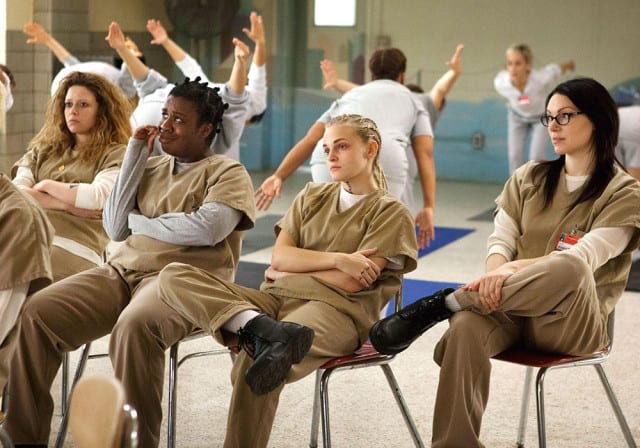CHRISTOPHER DEMARCUS — THE CASCADE (UNIVERSITY OF THE FRASER VALLEY)

Piper’s fellow inmates: Nicky Nichols (Natasha Lyonne), Suzanne Warren (Uzo Aduba), Tricia Miler (Madeline Brewer) and Alex Vause (Laura Prepon).
ABBOTSFORD (CUP) — Orange Is the New Black, a Netflix hit this year, is based on a 2010 memoir of its same name. It’s the story of Piper Kerman, an ex-con who is sent to prison on international drug smuggling charges.
Fans of the show have been hooked on the outrageous events that occur during Piper’s 15-month term in federal prison but, like most book-to-film adaptations, a lot gets lost in translation. At the book’s core is a brutally honest story of universal love, female solidarity, and the absurdity of North America’s justice system.
Between drug running and prison, Kermen spent a decade producing and writing infomercials; she is no stranger to the craft of storytelling. Unlike the show, there are no cheap, wacky punchline plot points. The book’s humour is smarter. The characters are more enduring. And the main subject is not the prisoners, but the justice system.
The novel is more complex, less complicated and moves with a different flow. The Netflix show employs a kind of pop “lipstick lesbian” chic that’s not in the book. Piper’s direct account takes a more authentic approach to romantic relationships and friendships. Lesbian prison rape is not as predominant as the show would have us believe; rather, the main threat is rape from the male guards with inflated egos. As Piper’s lawyer puts it: “The hardest thing will be chicken-shit rules, enforced by chicken-shit people.”
Reading Orange Is the New Black is as informative as it is touching. Piper shows us the bureaucratic labyrinth of the criminal justice system, right down to the strip searches she is subjected to every time she requests face-to-face time with visitors. Prison policy is designed to dehumanize each convict in order to control the prison population. All of these policies are applied equally, despite the “real world” social status of each prisoner. A 70-year-old woman is ordered to shovel snow in zero degree weather. A rich suburbanite housewife is required to fix the electrical in a dilapidated pump house.
Ethnicity is a big social divider, but Piper becomes aware of her own irrational judgement of race and class while in prison. Every woman is equalized by the same oppressive restrictions.
The book cuts deeper than the show. It’s about women loving women on both a platonic and romantic level. It’s about how communal sisterhood can help the individual endure. It’s got some big messages, not tampon jokes.
Piper Kerman has a love for literature, too. Novels and letters were tools for her to stay in touch with the outside world. Fun references to a multitude of literary works are carefully placed throughout.
Lean and strong writing with little unnecessary exposition builds a smooth non-fiction narrative. The words shine with honesty. It’s superior to the show. Read it.
—
Photo: Show Still
Leave a Reply